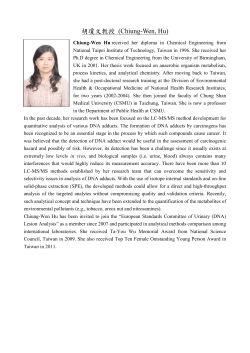
Iwijn De Vlaminck Cell-free DNA transplant diagnostics and single
February 18, 2015 700 Clark Hall, 4:00 pm Iwijn De Vlaminck Cornell University Cell-free DNA transplant diagnostics and single-cell sequencing Our research brings approaches from biophysics to genomics. We develop novel measurement principles in cell-free DNA diagnostics and single cell genomics. In this talk I will discuss two examples of recent work. In the first, I will focus on genomics-based diagnostics in organ transplants. Accurate and timely diagnosis of infection and graft rejection is an unmet medical need in transplantation. We hypothesized that sequencing analyses of cell-free DNA circulating in blood could simultaneously offer a window into the health of the transplant organ and the occurrence of viral and bacterial infections. We collected plasma samples from a large group of lung and heart transplant recipients and purified and sequenced the circulating cell-free DNA. We found that the majority of sequences match the transplant recipient’s genome but sequences derived from the transplant donor and from a large variety of viruses, bacteria and fungi were also identified. Donor-derived DNA is likely released in the blood circulation upon graft tissue damage and we found that the fraction of donor-derived DNA is an informative marker of transplant rejection in heart and transplants. We observed that the composition of viral sequences on the other hand is highly dynamic and strongly affected by immunosuppressive and antiviral drugs. In the second part, I will talk about our efforts to study microbial genetics at the single cell level. I will address challenges in whole genome amplification and will talk about our current efforts to interface genome sequencers with high-resolution microscopes. Host: Warren Zipfel Biophysics Colloquium chair: Warren Zipfel <wrz2@cornell.edu> Biophysics Colloquia website: http://www.biophysics.cornell.edu/seminars The Cornell Biophysics Colloquium is supported by generous contributions from Cornell departments and units: Nanobiotechnology Center, Chemistry & Chemical Biology, Applied & Engineering Physics, Biomedical Science, Physics, Molecular Biology and Genetics, Biomedical Engineering Program, CHESS, Molecular Medicine, Laboratory of Atomic and Solid State Physics, Vice Provost for Life Sciences, Vice Provost for Research, College of Engineering, College of Agriculture and Life Sciences, and the College of Veterinary Medicine.
© Copyright 2025





















